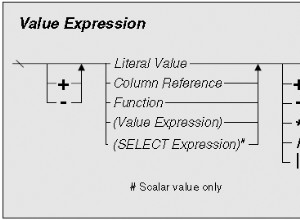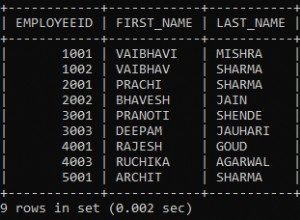Un enfoque bastante simple (y similar a lo que muestra el enlace de AskTom) es extraer todos los pares de año/mes y todos los pares de nombre/r_group, y luego unirlos:
with data as (
select 1 id, 'A' name, 'fruit' r_group, '2007' year, '04' month, 5 sales from dual union all
select 2 id, 'Z' name, 'fruit' r_group, '2007' year, '04' month, 99 sales from dual union all
select 3 id, 'A' name, 'fruit' r_group, '2008' year, '05' month, 10 sales from dual union all
select 4 id, 'B' name, 'vegetable' r_group, '2008' year, '07' month, 20 sales from dual
)
select a.year, a.month, b.name, b.r_group, nvl(d.sales, 0) as sales
from (select distinct year, month from data) a
cross join (select distinct name, r_group from data) b
left join data d on d.year = a.year and d.month = a.month and d.name = b.name and d.r_group = b.r_group
order by year, month, name, r_group;
YEAR MO N R_GROUP SALES
---- -- - --------- ----------
2007 04 A fruit 5
2007 04 B vegetable 0
2007 04 Z fruit 99
2008 05 A fruit 10
2008 05 B vegetable 0
2008 05 Z fruit 0
2008 07 A fruit 0
2008 07 B vegetable 20
2008 07 Z fruit 0
Pero eso produce más filas de las que quería con su primer nivel de agregación:
YEAR MO N R_GROUP SALES OPENING CLOSING
---- -- - --------- ---------- ---------- ----------
2007 04 A fruit 5 0 5
2007 04 B vegetable 0 0 0
2007 04 Z fruit 99 0 99
2008 05 A fruit 10 5 15
2008 05 B vegetable 0 0 0
2008 05 Z fruit 0 99 99
2008 07 A fruit 0 15 15
2008 07 B vegetable 20 0 20
2008 07 Z fruit 0 99 99
y cuando se agrega con su segundo nivel (de la otra consulta) produciría filas adicionales para, digamos, 2007/04/vegetable:
YEAR MO R_GROUP SALES OPENING CLOSING
---- -- --------- ---------- ---------- ----------
2007 04 fruit 104 0 104
2007 04 vegetable 0 0 0
2008 05 fruit 10 104 114
2008 05 vegetable 0 0 0
2008 07 fruit 0 114 114
2008 07 vegetable 20 0 20
que podría filtrarlos parcialmente antes de agregarlos porque todas las columnas intermedias serían cero:
with data as (
select 1 id, 'A' name, 'fruit' r_group, '2007' year, '04' month, 5 sales from dual union all
select 2 id, 'Z' name, 'fruit' r_group, '2007' year, '04' month, 99 sales from dual union all
select 3 id, 'A' name, 'fruit' r_group, '2008' year, '05' month, 10 sales from dual union all
select 4 id, 'B' name, 'vegetable' r_group, '2008' year, '07' month, 20 sales from dual
)
select year,
month,
r_group,
sum(sales) sales,
sum(opening) opening,
sum(closing) closing
from (
select t.*,
(sum(sales) over (partition by name, r_group
order by year, month
rows between unbounded preceding and current row
) -sales ) as opening,
sum(sales) over (partition by name, r_group
order by year, month
rows between unbounded preceding and current row
) as closing
from (
select a.year, a.month, b.name, b.r_group, nvl(d.sales, 0) as sales
from (select distinct year, month from data) a
cross join (select distinct name, r_group from data) b
left join data d
on d.year = a.year and d.month = a.month and d.name = b.name and d.r_group = b.r_group
) t
)
where sales != 0 or opening != 0 or closing != 0
group by year, month, r_group
order by year, month;
para obtener:
YEAR MO R_GROUP SALES OPENING CLOSING
---- -- --------- ---------- ---------- ----------
2007 04 fruit 104 0 104
2008 05 fruit 10 104 114
2008 07 fruit 0 114 114
2008 07 vegetable 20 0 20
Podría filtrar aún más ese resultado para eliminar filas donde el valor de ventas agregado sigue siendo cero, aunque si lo está haciendo, el filtro antes la agregación ya no es necesaria; pero sigue siendo un poco desordenado. Y no está claro si su agregación más externa se puede modificar para hacer eso.




